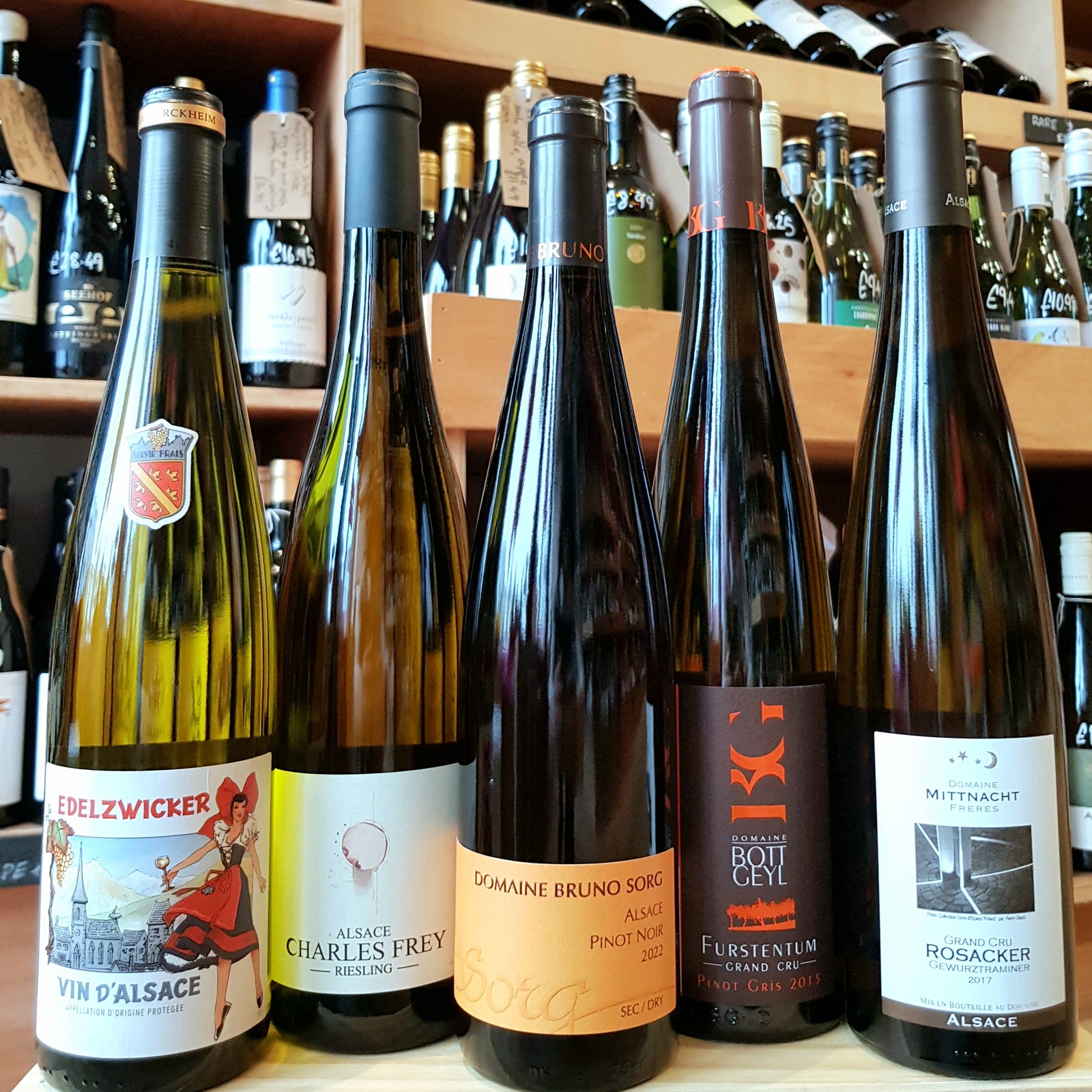
Famous for its gastronomy and picturesque villages, the French region of Alsace produces some of the country's deepest and most long-lived white wines. The vineyards of Alsace form a line going north-to-south through the medieval town of Colmar, close to the German border. Despite their northerly altitude, the vineyards of Alsace experience a warm and dry climate thanks to the rain shadow cast by the Vosges mountains. This allows for long, slow ripening and harvesting late into the autumn giving wines great depth and concentration of flavour. The dry climate also means there is reduced risk from fungal diseases, which has lead to widespread adoption of organic viticulture among winemakers in the region.
The Grapes
Unusually for French wine, most Alsatian wines will be single-varietal and bottled with the name of the grape variety on the label. The exception to this is the local table wine, Edelzwicker, a refreshing blend of different grapes.
Alsace is a region predominantly known for its white wines; the most important varieties are Riesling, Pinot Gris and Gewurztraminer with Muscat, Sylvaner, Auxerrois and Pinot Blanc also grown. Pinot Noir is the only red grape permitted for use in Alsace wines.

Turckheim Edelzwicker Vin d'Alsace NV - £12.99 Vegan, Sustainable
Alsace is home to a number of excellent co-operatives, chiefly the Cave de Turckheim led by winemaker Michael Lihrmann. Under his leadership the entire group of growers have been certified sustainable by HVE, and 70 hectares of vineyard are now certified organic.
For their Edelzwicker, Lihrmann selects Riesling for power and minerality, Pinot Blanc for soft floral character and Sylvaner for its precise, green apple freshness. The resulting wine is an exceptionally drinkable white, ideal for drinking with fresh cheeses, salads or seafood.

Charles Frey Riesling Granite 2020 - £21.49 Vegan, Organic, Biodynamic
The archetypal Alsace Riesling is a fully dry wine, with a fuller body and riper fruit notes than its German counterparts, and powerful minerality. The best examples are capable of aging for decades, developing honey, sweet spice and characteristic petrol aromas.
The Frey family have been farming in the village of Dambach-la-Ville since 1709, developing a deep connection to the land here. Charles Frey's journey as a winegrower began in 1958 with just 0.75 hectares of vines given to him by his father. In 1997 he was convinced by his son, Dominique, to convert the now 14 hectare estate to organic and biodynamic farming, making them among the first in Alsace to do so.
The vineyards of Dambach-la-Ville grow in granitic soil, which tends to produce wines of excellent power and freshness, particularly for Riesling. Aromas of bergamot, donut peach and preserved lemon lead to a very focused and grippy palate, finishing bone-dry and mineral. The outstanding freshness and intensity allows for a real variety of food pairings: roast pork with apples, salmon gravlax or seared scallops would all be enhanced by this stunning wine.

Domaine Bruno Sorg Pinot Noir 2022 - £19.99
Pinot Noir from Alsace tends towards a delicate, red-fruited and light-bodied style, as many growers tend to reserve their warmest vineyards for their white grapes.
Founded in 1965 by Bruno Sorg and now run by his son and grandson, Francois and Antoine, this estate is located in the beautiful village of Eguisheim. Surrounding Eguisheim is a patchwork of different soil types and exposures, including sandstone, limestone, gravels and clay. This gives Francois and Antoine the ability to blend between different plots for their unique characteristic, making harmonious and balanced wines.
Their Pinot Noir is joyfully light, at just 12.8% alcohol, with pretty redcurrant and wild strawberry notes on the nose. Fresh and smooth, with silky tannins and clean acidity, more red fruits and subtle star anise and mineral notes. Wonderfully drinkable and a nice pairing for chicken breast or simple pasta dishes.
The Grand Crus
The 51 vineyards given the Grand Cru designation in Alsace make up just 5% of the region's production, and represent the pinnacle of wines in the region. Thanks to the varied soil types and the impact of the Vosges foothills, each site has its own unique character to discover. Only the 'noble' Alsace varieties are permitted the Grand Cru label: Riesling, Pinot Gris, Gewurztraminer and Muscat (there is one exception in the Zotzenberg where Sylvaner is permitted). This means that a Pinot Noir grown in a Grand Cru vineyard cannot bear the name of the site, which some of the region's leading red winemakers are trying to change.

Domaine Bott-Geyl Pinot Gris Grand Cru Furstentum 2015 - £37.50 Organic, Biodynamic
With its honey, spice and pear perfume and rich full body, Alsatian Pinot Gris couldn't be further in style from the light and subtle Pinot Grigios from Italy.
Another historic family estate, farming vines around the village of Beblenheim since 1695. Jean-Cristophe Bott has been the custodian of the domaine since 1993 and lead the conversion to organics and biodynamics in the early 2000s. Very high density and low yields in the vineyard and fermentation with wild yeast in old oak vats are key to the quality of their wines.
The Grand Cru Furstentum rises to 400m above the village of Kientzheim, a steep slope of up to 37% gradient with a perfect southeast exposure giving great ripeness to the wine. The resulting Pinot Gris is a decadent off-dry style, with layers of honey, mango, stone fruit, nutmeg and toasted nut aromas wafting from the glass. Even with the high level of ripeness, the chalky marl soils impart a wonderful sensation of freshness to the extremely long finish. A wine to share with special company and a selection of fine cheeses.

Domaine Mittnacht Gewurztraminer Grand Cru Rosacker 2017 - £31.50 Organic, Biodynamic
Gewurztraminer, with its alluring lychee, rose and ginger perfume reaches its absolute greatest heights in Alsace, soaking up sunshine on the sloping hillsides.
Domaine Mittnacht Freres, founded in 1963 by current winemaker Marc's grandfather, sits underneath the fortified church of the village of Hunawihr. For two decades he ran the estate with his cousin Christophe, before they agreed in 2019 to split the estate in two to allow them to each explore their own winemaking vision - we also stock some of Christophe's excellent wines.
The Grand Cru Rosacker is a cooler, very dry site, planted in deep limestone soils and is home to some of the most mineral, poised and precise wines in the region. For Gewurztraminer this provides a wonderful balance to the heady perfume, resulting in a medium-sweet wine with deep, spicy complexity. Orange blossom, lily, pain d'epices and pineapple lead the aromatics and the palate is incredibly silky and persistent. Try this is an aperitif, with light, fruity desserts or with spicy seafood dishes.



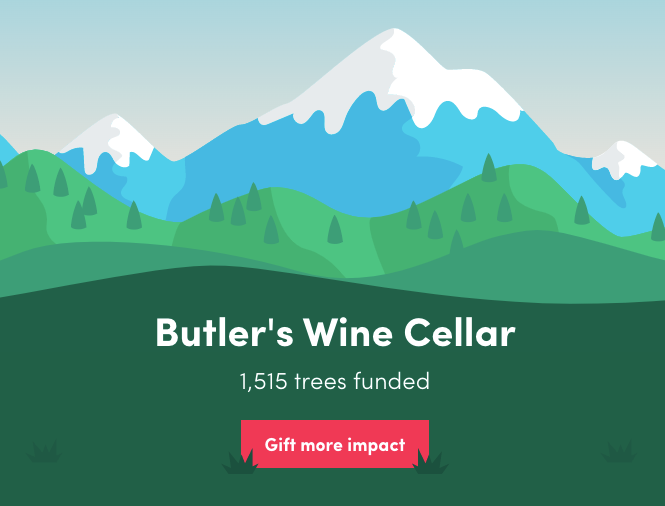


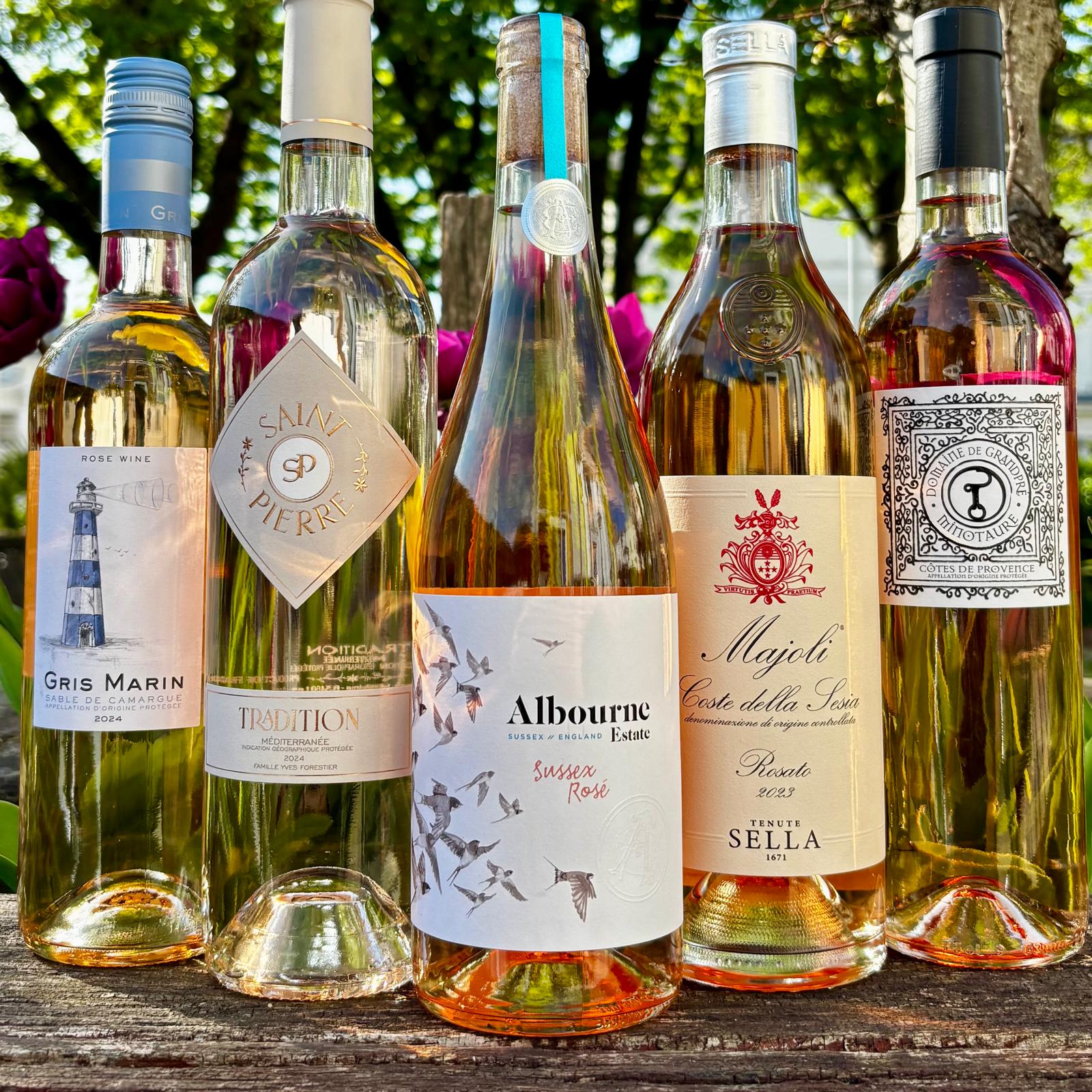
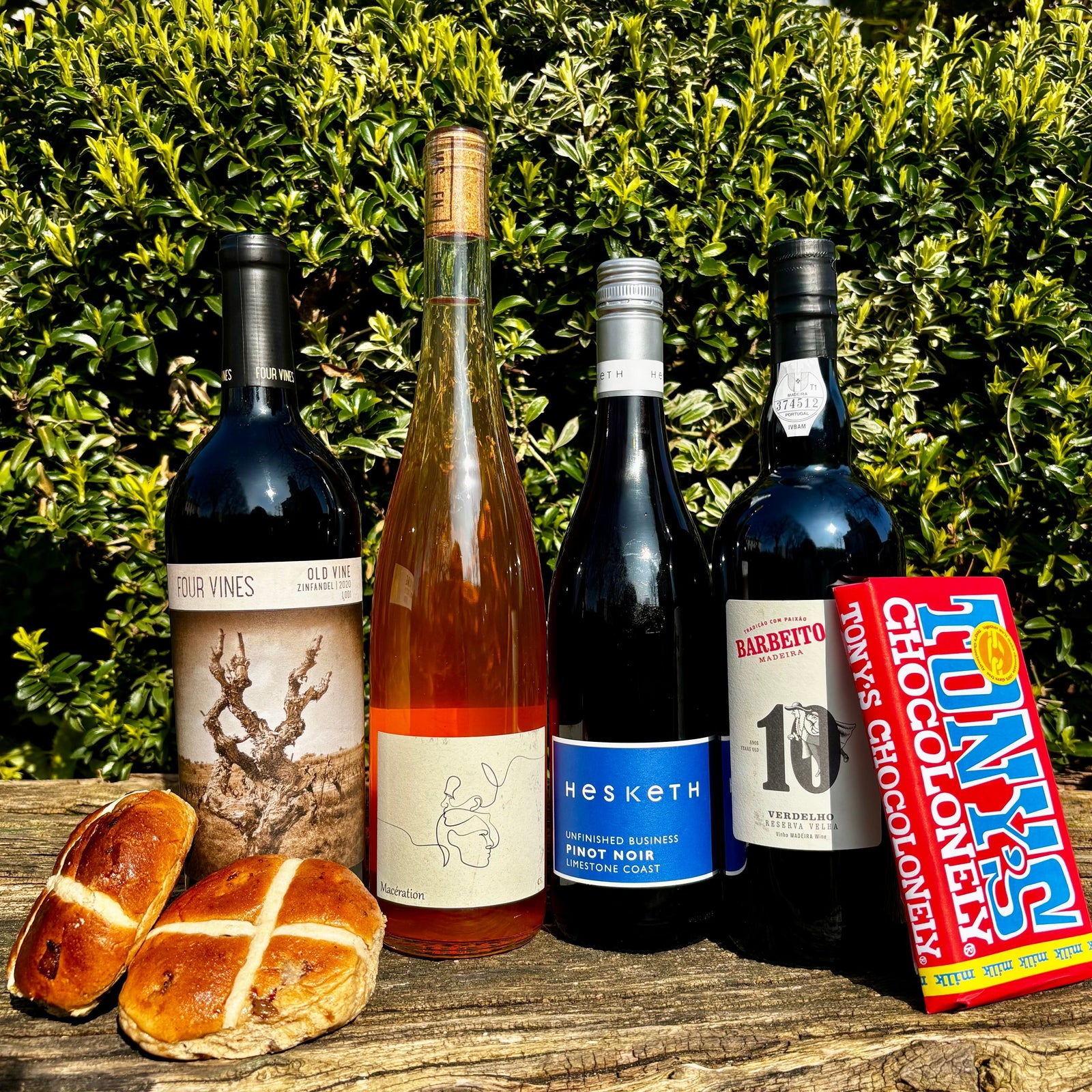
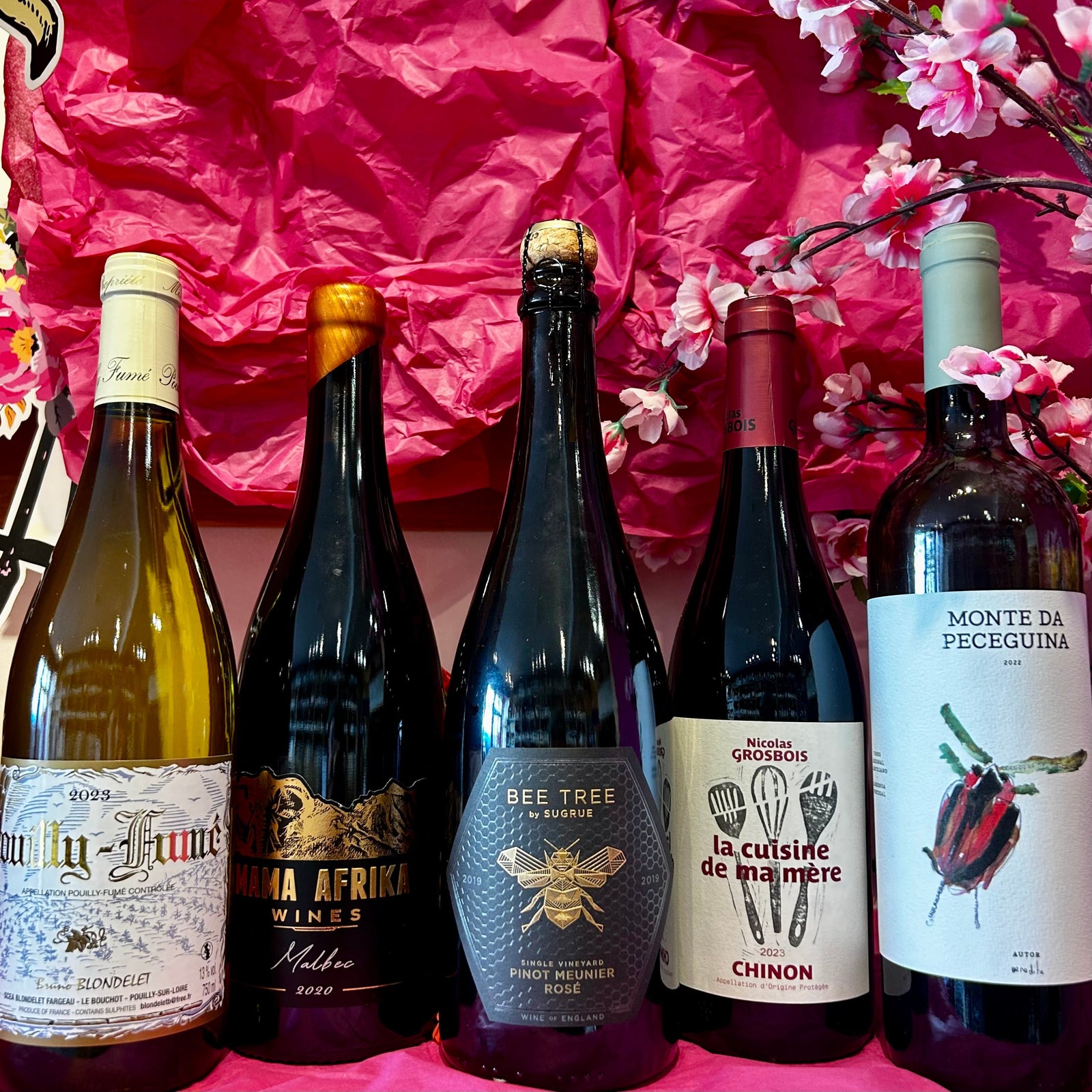
Leave a comment (all fields required)